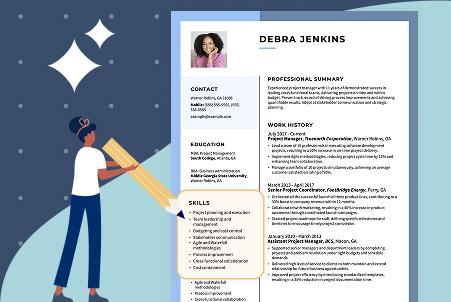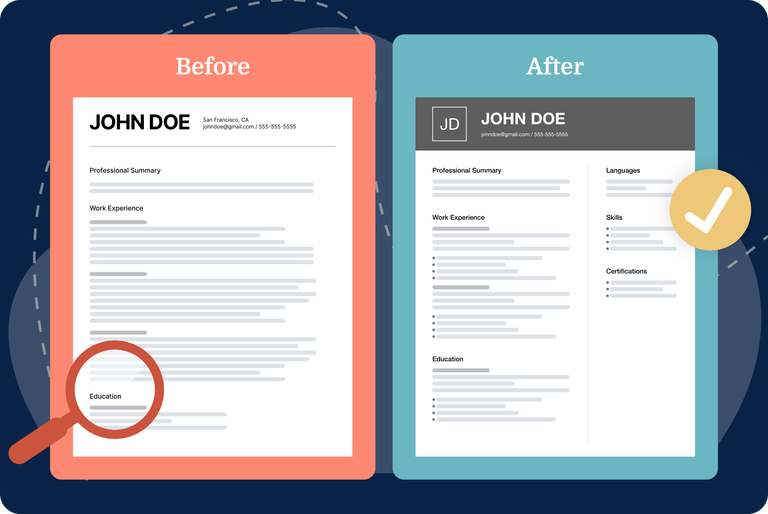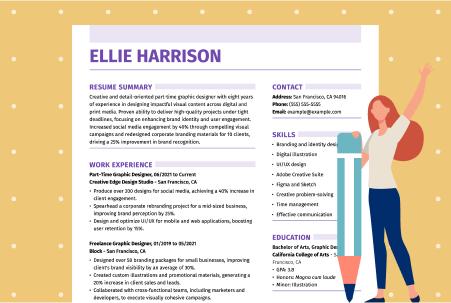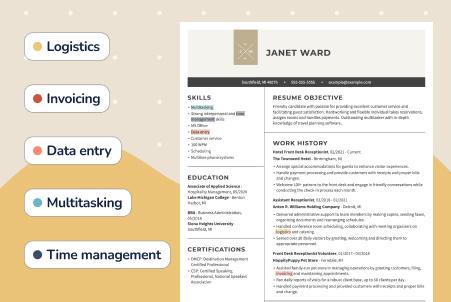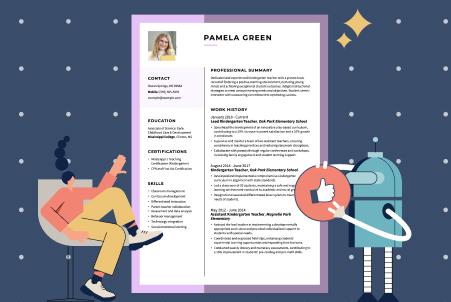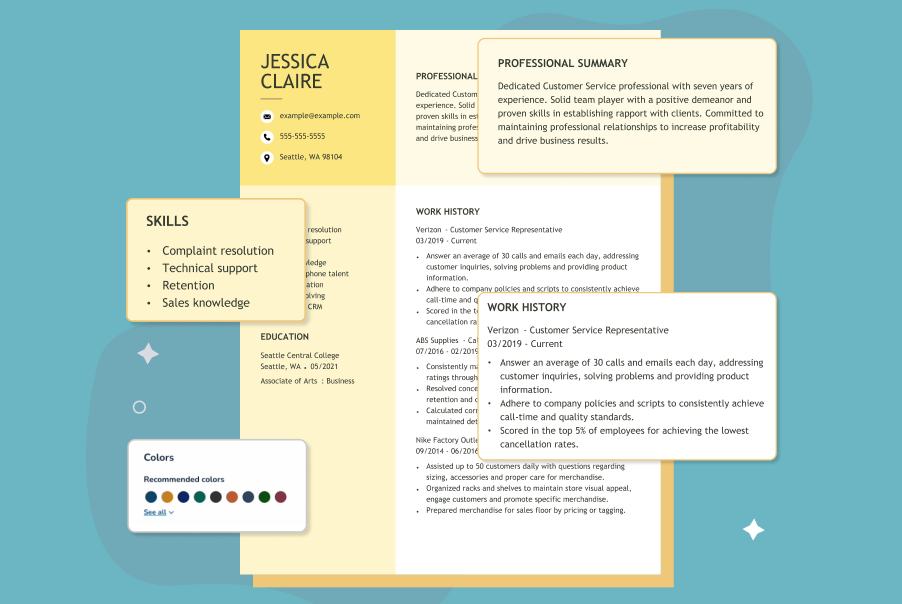Leadership Skills: Examples & Tips for Your Resume

Our customers have been hired at: *Foot Note
AI Resume Skills Generator
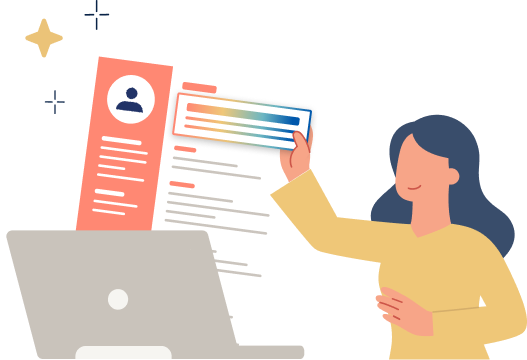
In today's competitive job market, showcasing your leadership skills on your resume can set you apart from other candidates. Leadership skills are valuable for managerial positions and roles at all organizational levels. Whether leading a project team or guiding your colleagues through a challenging task, these skills demonstrate your ability to take charge and drive success. Here we provide examples of essential leadership skills to include on your resume and practical strategies for mastering and applying them effectively in the workplace. Read our guide, How to Write a Resume, for tips and strategies on crafting an impressive leadership-focused resume.
What are leadership skills?
Leadership skills enable individuals to effectively guide and influence others within an organization or team. They include clear and persuasive communication, sound decision-making under pressure, complex problem-solving and the ability to inspire others toward a common goal. A good leader possesses emotional intelligence, enabling them to understand and manage their own emotions while empathizing with others.
Strong leaders are excellent strategic thinkers who can envision future opportunities and devise plans to achieve long-term objectives. Effective leaders also empower their teams delegate tasks efficiently, and foster a collaborative environment where everyone feels valued and motivated to contribute their best efforts. Ultimately, leadership skills are crucial for driving organizational success, promoting innovation, and cultivating a positive work culture where individuals can thrive and achieve collective goals.
Top leadership skills for your resume
Leadership skills are indispensable in the workplace as they are the cornerstone for organizational success and employee engagement. Effective leadership fosters a cohesive work environment where clear communication, strategic decision-making, and adept problem-solving are the norm. Leaders inspire and motivate teams, driving them towards common goals with enthusiasm and clarity. They cultivate a culture of trust and collaboration, empowering individuals to contribute their best efforts and innovate freely.
Strong leadership ensures that challenges are met with resilience and opportunities are seized optimally, navigating the organization through dynamic market landscapes and technological advancements. Leadership skills not only enhance productivity and efficiency but also nurture a supportive and progressive workplace culture where both personal and organizational growth flourish.
Here are our top leadership skills for work:
- Communication: Clearly conveying ideas and information to others.
- Decision-making: Making informed and timely decisions.
- Problem-solving: Identifying and resolving issues efficiently.
- Delegation: Assigning tasks and responsibilities effectively.
- Motivation: Inspiring and encouraging team members to perform their best.
- Conflict resolution: Mediating disputes and finding mutually agreeable solutions.
- Adaptability: Adjusting strategies and approaches in response to changing circumstances.
- Empathy: Understanding and considering the feelings and perspectives of others.
- Strategic thinking: Developing long-term goals and plans to achieve objectives.
- Feedback delivery: Providing constructive feedback to help team members improve performance.
Examples of leadership skills in the workplace
Using leadership skills in the workplace involves applying various abilities to manage and guide teams effectively. Here are some examples of how you might apply specific leadership skills across multiple workplace scenarios:
Risk management
Scenario:
As a project manager at a tech company, you are leading a software development project with a tight deadline. Midway through the project, a key supplier informs you of a delay in delivering critical components.
Application:
You apply risk management skills by quickly assessing the delay's impact on the project timeline and budget. You then develop a contingency plan, including identifying alternative suppliers and reallocating resources to prioritize tasks that can be completed without the delayed components. Communicating these adjustments to your team and stakeholders ensures the project stays on track and mitigates potential disruptions.
See also:
Critical evaluation
Scenario:
As the marketing director at a consumer goods company, you are tasked with evaluating the effectiveness of a recent advertising campaign to determine future marketing strategies.
Application:
You use critical evaluation skills to analyze the campaign's performance data, including metrics such as reach, engagement and conversion rates. You compare these results with industry benchmarks and past campaigns. Through this analysis, you identify which campaign elements were successful and which were not, allowing you to make data-driven decisions to improve future marketing efforts and optimize the company's advertising spend.
See also:
Adaptability
Scenario:
As a sales manager at a retail company, you suddenly face an unexpected market shift due to a new competitor entering the market, affecting your sales targets.
Application:
You demonstrate adaptability by quickly reassessing your sales strategy. You gather your team to brainstorm new approaches, such as targeting different customer segments or emphasizing unique product features that differentiate your brand from competitors. By being flexible and responsive to changing market conditions, you help your team adjust their sales tactics, maintain morale, and achieve revised sales goals.
See also:
Logical reasoning
Scenario:
As a financial analyst at an investment firm, you evaluate the potential of a new investment opportunity in a volatile market.
Application:
You apply logical reasoning by systematically analyzing financial statements, market trends, and economic indicators. You construct various financial models to predict the investment's potential returns and risks under different scenarios. Through this structured approach, you provide a clear, reasoned recommendation to your management team, supporting their decision-making process with solid evidence and rational analysis.
See also:
Strategic thinking
Scenario:
As the human resources director at a large corporation, you are tasked with developing a long-term talent acquisition strategy to support the company’s growth plans over the next five years.
Application:
You use strategic thinking to forecast staffing needs based on projected business expansion and industry trends. You evaluate current recruitment practices, identify potential gaps, and propose innovative solutions, such as partnerships with universities, enhanced employee referral programs, and leveraging advanced recruitment technologies. By aligning the talent acquisition strategy with the company's long-term goals, you ensure a steady pipeline of skilled employees to support sustainable growth.
See also:
Analytical thinking
Scenario:
As a data scientist at an e-commerce company, you are asked to analyze customer purchase patterns to identify opportunities for increasing sales.
Application:
You employ analytical thinking by collecting and examining large datasets from various sources, such as website traffic, transaction histories and customer feedback. You use advanced analytics techniques, including machine learning algorithms, to uncover hidden patterns and correlations. Based on your analysis, you provide actionable insights, such as recommending personalized marketing strategies and optimizing product recommendations, which help the company enhance customer experience and drive sales growth.
See also:
Leadership skills for leaders
Leadership skills for leaders encompass a blend of competencies that are essential for guiding teams, inspiring trust and driving organizational success. Effective leaders demonstrate strong communication skills, ensuring clarity in conveying goals, expectations and vision to their teams. They excel in decision-making, making informed choices that align with strategic objectives and empower their teams to achieve desired outcomes. Problem-solving abilities helps leaders to navigate challenges adeptly, fostering innovation and continuous improvement within their organizations, and time management enables them to optimize their productivity and effectiveness in leadership roles.
Moreover, leaders cultivate a supportive and inclusive work environment by leveraging skills in empathy, emotional intelligence and conflict resolution. They exhibit adaptability in responding to changes in the business landscape and motivate their teams through encouragement, recognition and professional development opportunities. Ultimately, leadership skills enable leaders to not only achieve goals but also to inspire and empower their teams to reach their fullest potential.
Key skills for leaders include:
- Visionary thinking: Creating and communicating a compelling vision for the future.
- Emotional intelligence: Understanding and managing your emotions and those of others.
- Conflict resolution: Effectively addressing and resolving conflicts.
- Team building: Fostering collaboration and cohesion within the team.
- Mentoring: Providing guidance and support to help team members grow and develop.
- Decision-making: Making informed and timely decisions to guide the team and organization.
- Innovation: Encouraging creativity and developing new ideas and solutions.
- Delegation: Assigning tasks effectively to maximize team efficiency and productivity.
- Time management: Prioritizing tasks and managing time efficiently to meet deadlines and achieve goals.
- Customer focus: Prioritizing the needs and preferences of customers to enhance their experience and drive business success.
See also:
How to improve your leadership skills
Honing your leadership skills can significantly enhance your professional effectiveness and career prospects.
Here are our top 10 tips for enhancing your leadership skills:
Seek feedback and act on it: Regularly ask for feedback from peers and supervisors and use it to improve.
Take on leadership roles and responsibilities: Volunteer for leadership opportunities to gain experience.
Participate in leadership training programs: Enroll in courses and workshops to learn new skills.
Continuously learn and develop new skills: Stay updated with the latest trends and best practices in leadership.
Observe and learn from successful leaders: Identify leaders you admire and observe their strategies and behaviors.
Practice active listening: Focus on listening to understand, rather than to respond, in your interactions.
Set personal development goals: Establish clear, achievable goals for your leadership development and track progress.
Network with other leaders: Build relationships with other leaders to share experiences, insights and advice.
Engage in self-reflection: Regularly reflect on your experiences and actions to gain insights into your leadership style and areas for improvement.
Develop emotional intelligence: Work on understanding and managing your emotions and those of others to build stronger, more effective relationships.
Resources for developing leadership skills
- Online courses and webinars: These resources offer convenient and flexible opportunities to develop leadership skills. Choose courses focusing on communication, decision-making, conflict resolution and other essential leadership competencies.
- Books and articles on leadership: Read various sources for rich insights into various aspects of leadership theory, practice and case studies. Compare and contrast different perspectives or approaches to deepen your understanding of leadership theories and their practical implications.
- Professional organizations: Take advantage of networking opportunities, access to industry-specific resources and professional development activities that can enhance leadership skills. Join organizations relevant to your industry or career path to stay updated on current trends, leadership advancements and best practices.
- Conferences, workshops, or webinars: Network with fellow professionals to exchange insights, challenges and best practices in leadership development. Participate in special interest groups or workshops that offer hands-on experience in applying leadership skills to real-world scenarios.
- Mentorship and coaching programs: Seek personalized guidance and support to develop leadership skills effectively. Look for mentors who are experienced leaders in your industry or profession.
- Leadership skills training programs: These programs offer structured learning experiences to develop competencies essential for effective leadership. Look for programs emphasizing communication, decision-making, problem-solving and strategic thinking skills.
Key takeaways
Let's review what you’ve learned about leadership skills from this guide:
- Leadership skills are essential for guiding and motivating teams.
- Key leadership skills include communication, decision-making and problem-solving.
- Applying leadership skills in the workplace involves risk management, adaptability and strategic thinking.
- Developing leadership skills can significantly enhance your career growth.
- Resources and training tips are available to improve your leadership skills.
FAQ
What are some good leadership skills to include on a resume?
When crafting a resume, it’s essential to highlight leadership skills that demonstrate your ability to guide teams, drive projects forward and foster a positive work environment. Some impactful leadership skills to include on a resume include:
- Communication: Effectively conveying ideas and information to team members, stakeholders and clients.
- Decision-making: Making informed and timely decisions based on data and strategic considerations.
- Problem-solving: Identifying challenges, analyzing root causes and implementing effective solutions.
- Team building: Developing cohesive teams through motivation, collaboration and empowerment.
- Strategic thinking: Planning and executing long-term goals aligned with organizational objectives.
- Adaptability: Flexibility in responding to changing circumstances and guiding teams through transitions.
- Emotional intelligence: Understanding and managing emotions to foster a positive and productive work environment.
- Delegation: Assigning tasks effectively based on team members’ strengths and promoting accountability. Highlighting these skills demonstrates your readiness to lead and contribute effectively in any professional setting.
How can I develop my leadership skills?
Developing leadership skills involves a combination of self-awareness, practical experience and continuous learning.
- Start by assessing your current strengths and areas for improvement through self-reflection or feedback from peers and mentors.
- Engage in leadership development programs such as workshops, seminars, or online courses that focus on communication, decision-making, problem-solving and other essential leadership competencies.
- Actively seek opportunities to lead projects or initiatives within your current role or volunteer for leadership positions in professional organizations.
- Cultivate relationships with mentors who can provide guidance, support and valuable insights into effective leadership practices.
- Practice active listening, empathy and emotional intelligence to enhance your ability to understand and motivate others.
- Reflect on your experiences, learn from challenges, and adapt your leadership style accordingly.
How do I highlight my leadership skills on my resume?
Highlighting your leadership skills on a resume involves strategically showcasing experiences and achievements demonstrating your ability to lead and influence others effectively.
- Start by incorporating specific examples of leadership roles or projects where you played a pivotal role.
- Use action verbs such as “led,” “managed,” “organized,” or “oversaw” to describe your responsibilities and accomplishments.
- Quantify your professional achievements when possible to illustrate the impact of your leadership—for example, “Led a team of 10 in achieving a 30% increase in sales” or “Managed a project that reduced operational costs by 20%.”
- Include leadership-related skills such as communication, decision-making, team building and strategic planning in the skills section of your resume.
- Highlight any certifications, awards, or recognition related to leadership or management.
- Tailor your resume to emphasize leadership experiences relevant to the job you’re applying for, aligning your skills with the employer’s requirements to demonstrate your suitability for the role.
What is the best way to demonstrate leadership skills in an interview?
The best way to demonstrate leadership skills in a job interview is to provide specific examples from your professional experience where you successfully led teams, projects, or initiatives.
- Start by clearly articulating the challenge or goal you faced, outlining your actions to address it and emphasizing the outcomes achieved through your leadership.
- Highlight your ability to communicate effectively, make decisive decisions, solve problems and motivate others towards a common objective.
- Use concrete metrics or anecdotes to illustrate your impact, such as team performance improvements, successful project completions, or instances where your leadership led to innovation or organizational growth.
- Demonstrate your emotional intelligence by providing examples of how you have handled challenges and conflicts and inspire teamwork.
What are the most effective leadership skills in a remote work environment?
What role do leadership skills play in team performance?
Leadership skills are pivotal in team performance by influencing how teams are guided, motivated, and organized toward achieving goals. Effective leadership fosters a cohesive and productive team environment where members feel motivated, supported and valued. Leaders with strong communication skills ensure clarity in goals and expectations, reducing misunderstandings and fostering alignment.
Decision-making skills enable leaders to make timely and informed choices that steer teams toward success, while problem-solving abilities help navigate challenges and remove obstacles that hinder progress. Leadership skills in delegation empower team members, allowing them to leverage their strengths and contribute effectively to collective objectives. Overall, leadership that promotes trust, collaboration and continuous improvement significantly enhances team performance, encouraging innovation, resilience, and a shared commitment to achieving excellence.
How can I demonstrate leadership skills effectively in a cover letter?
Demonstrating leadership skills in a cover letter involves highlighting specific examples and achievements that showcase your ability to lead effectively. Start by discussing experiences where you took on leadership roles, such as leading projects, teams, or initiatives. Describe your challenges, your actions to address them, and the outcomes or achievements resulting from your leadership.
Use metrics or specific results to quantify your impact whenever possible, such as percentages of improvement, cost savings, or successful project completions. Emphasize key leadership competencies such as communication, decision-making, problem-solving and team building. Highlight instances where you demonstrated initiative, innovation and the ability to motivate and inspire others. Tailor your examples to align with the job requirements and company culture, showing how your leadership skills make you a strong candidate for the position.
Our customers have been hired at:*Foot Note
